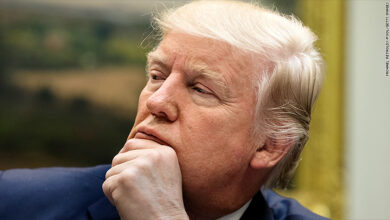White House Announces New Minimum Tax on Billionaires
White House announces new minimum tax on billionaires, a move that has sent ripples through the financial world and sparked heated debate. This proposed legislation aims to ensure that America’s wealthiest individuals pay a minimum tax rate, regardless of their income sources. The Biden administration argues that this measure is essential to address growing inequality and ensure that everyone contributes their fair share.
However, critics contend that this policy could stifle investment and economic growth, arguing that it unfairly targets a select group of individuals.
The proposal has been met with mixed reactions, with some praising its potential to reduce income disparity and others expressing concerns about its impact on the economy. The debate is likely to intensify as lawmakers delve into the details of the proposal, weighing its potential benefits against its potential drawbacks.
The Announcement: White House Announces New Minimum Tax On Billionaires
In a significant move aimed at addressing income inequality and ensuring a fairer tax system, the White House has announced a new minimum tax on billionaires. This proposal, if enacted, would require the wealthiest Americans to pay at least a certain percentage of their total income in taxes, regardless of their current tax avoidance strategies.The new tax aims to ensure that the ultra-wealthy contribute their fair share to the nation’s coffers.
The White House argues that the current tax code allows billionaires to exploit loopholes and avoid paying taxes on their substantial wealth, while ordinary Americans bear a disproportionate burden.
The Proposed Tax Rate and Application
The White House has proposed a minimum tax rate of 20% on billionaires’ income, which includes not only their wages and salaries but also their capital gains, dividends, and other forms of income. This means that regardless of how they structure their finances, billionaires would be required to pay at least 20% of their total income in taxes.The proposed tax would be applied to billionaires’ total income, including their wages, salaries, capital gains, dividends, and other forms of income.
This would ensure that the tax captures all forms of income, regardless of how it is generated.
Rationale Behind the Announcement
The White House’s announcement of the minimum tax on billionaires is rooted in several key arguments. The first is that the current tax code allows the wealthiest Americans to exploit loopholes and avoid paying taxes on their substantial wealth, while ordinary Americans bear a disproportionate burden.The second argument is that the concentration of wealth at the top has reached unsustainable levels, exacerbating income inequality and hindering economic growth.
The White House believes that a minimum tax on billionaires would help to address this issue by ensuring that the ultra-wealthy contribute their fair share to the nation’s coffers.
Impact on Billionaires
The White House’s new minimum tax on billionaires is expected to have a significant impact on the wealthiest individuals in the United States. This tax, which would apply to households with a net worth of $100 million or more, could reshape the financial landscape for billionaires, potentially leading to changes in their investment strategies, philanthropic activities, and even their overall lifestyle.
Financial Implications for Billionaires
The minimum tax, which is designed to ensure that billionaires pay at least 20% of their income in taxes, could have a substantial financial impact. Billionaires who currently pay less than 20% in taxes will be required to make up the difference, potentially resulting in a significant increase in their tax liability. For example, a billionaire with a net worth of $1 billion who currently pays only 10% in taxes would need to pay an additional $100 million in taxes under the new minimum tax.
Industries and Sectors Most Likely to be Affected, White house announces new minimum tax on billionaires
The industries and sectors most likely to be affected by the minimum tax include:
- Technology: The tech industry is home to many billionaires, including founders of major tech companies like Apple, Microsoft, and Google. These individuals are likely to be significantly impacted by the new minimum tax, as their wealth is often derived from stock options and other forms of equity compensation.
- Finance: The finance sector is another industry with a high concentration of billionaires. Hedge fund managers, private equity investors, and other financial professionals could see a significant increase in their tax liability under the new minimum tax.
- Real Estate: Real estate moguls are also likely to be affected by the minimum tax. Individuals with large real estate holdings, particularly those who have leveraged their assets to generate significant income, could face a higher tax burden.
Changes in Investment Strategies
The minimum tax could lead to changes in investment strategies for billionaires. Some billionaires may choose to invest in assets that are less likely to be subject to the tax, such as tax-exempt bonds or real estate investments that generate passive income. Others may seek to diversify their portfolios by investing in a wider range of assets, including international investments, to reduce their tax liability.
Changes in Philanthropic Activities
The minimum tax could also impact billionaires’ philanthropic activities. Some billionaires may be more inclined to donate to charities through donor-advised funds or other vehicles that offer tax benefits. This could lead to a shift in the way philanthropic dollars are allocated, with a greater emphasis on charitable giving that aligns with the tax code.
The proposed minimum tax on billionaires is a complex issue with far-reaching implications. It has ignited a debate about the role of government in regulating wealth and the responsibilities of the ultra-wealthy. As the discussion unfolds, it will be crucial to examine the potential economic and social impacts of this policy, considering both its intended benefits and its potential unintended consequences.
The outcome of this debate will shape the future of taxation and the balance of wealth in America for years to come.
While the White House is busy crafting new policies like the proposed minimum tax on billionaires, the world is watching events unfold in Ukraine. Russia Confirms Missile Strikes on Lviv as Biden Visits Poland , adding another layer of complexity to the already volatile situation. Despite the international focus on the war, the White House continues to push for domestic initiatives, aiming to address economic inequality and bolster the nation’s fiscal stability.
The White House’s announcement of a new minimum tax on billionaires has sparked a wave of reactions, from applause to outrage. Meanwhile, in a different kind of battle, commercial airline pilots are taking to the courts, filing their first lawsuit over the transportation mask mandate in a case titled Chaos in the Sky: Pilots Sue Over Mask Mandate.
It seems like the air is thick with tension these days, both on the ground and in the sky, as the government continues to grapple with issues of wealth inequality and public health.
The White House’s new minimum tax on billionaires is sure to spark debate, but it’s important to remember that this isn’t the only pressing issue facing our nation. A recent study, Post-Vaccination Heart Issues: A Studys Shocking Findings , has revealed concerning findings about potential long-term health effects of COVID-19 vaccines. This study highlights the need for continued research and transparency, even as we address critical issues like economic inequality.





